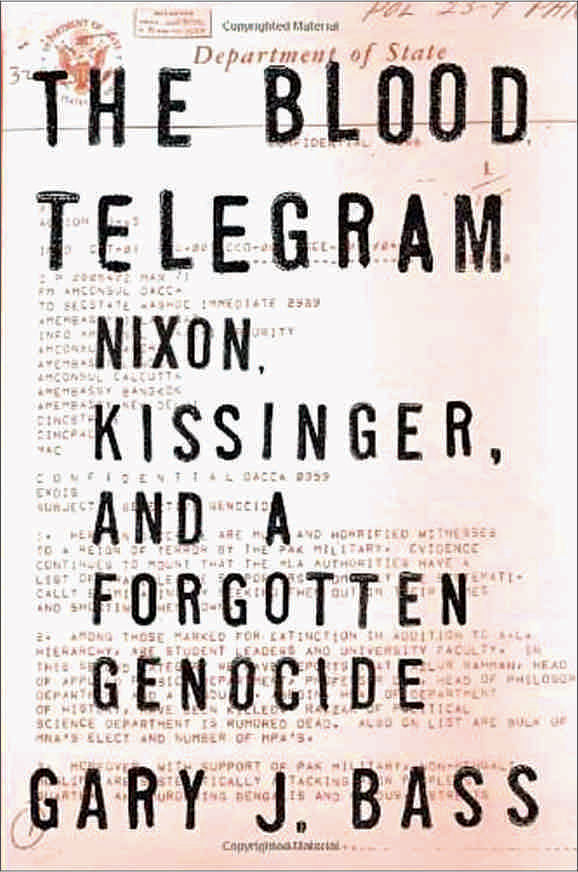Written in Blood
Written in Blood

In The Blood Telegram: India's Secret War in East Pakistan Gary J Bass, with credential of being an author, a Professor of politics at Princeton and a restless narrator on South Asia, keeps the truth behind the events well in order that shook the subcontinent.
Soon after the horrific riots and horrific partition became a reality in 1947, the heady days of independence followed but it became clear too that the newly born nation – Pakistan – had to deal with a cocktail of flawed democracy, deeply drenched in fundamentalist colour, and pertinently with a democratic India – it would divide and brutally discriminate its 'own land' based on the designed tags of geography (east or west), language (Urdu or Bangla) and loyalty (for despotic leadership or change) .

The people from East Bengal were cheated a lot – with their most inhuman experiences during the monstrous colonial times and later on, right after the independence that brought even bloodier prospects for the scores of masses, adrift from highly cunning but decisive political planning by their self serving leaders.
The obsession of Pakistani leaders to ignore the rational of religious, cultural and lingual diversity had made in no time its democracy, morphed with propaganda overdose and finally a clownish system. The leaders from both the sides were never found themselves at bonhomie with each other – although the exceptional cases of master opportunists' have to be overlooked in that context.
Things stayed like that for 23 years, with the Bengalis in the east feeling increasingly neglected by the Punjabis in the west, where the capital and power was centred. This saw a new manifestation in December 1970, when Sheik Mujibur Rahman's party, the Awami League, won the election on the promise of autonomy for East Pakistan. Gen Yahya Khan arrested Rahman and ordered the army to come brutally on the Bengalis.
With undeterred focus, the book goes to study on those black patches of Indian subcontinent, sparked off one of the bloodiest wars in the 20th century – the attack on ordinary East Pakistanis. The author's revelations resulted through his delving with newly declassified documents, unheard Whitehouse tapes and a meticulous investigation.
So, the archival references and footnotes are into liberal supply – albeit it appears logical as the nature of this kind of the book should not rely too heavily on opinionated discretions alone. Thus probably, Garry J Bass gives his heart on the issues and investigates quite authentically the relation between key players that sparked off the attacks in Bangladesh--specifically India, Pakistan, the United States of America, China and the Soviet Union.
Bass has succeeded immensely to bring in focus the White House diplomacy that attended it. This angle of looking on the dark chapters of history makes the ugly phase of cold war clearer. Among the remarkable qualities of this book is mention of an American diplomat, Archer Blood – who like many unsung heroes risked his career in disobedience to rubbed under the White House and staying on course of truth.
Kissinger and Nixon's conversations on the pages of the book are the precious contribution by Bass. It is well evident that the history of the Indo-Pakistan friction, surfaced through the popular sources and known by the masses is not exactly as it seems. Certainly, there were other players, who influenced the course of action but yet their mention missed into information sources and so in collective consciousness. That is such a pity.
This book, with its fixtures and fitting aptly balanced, offers good chance to all those who have enthusiasm left to know about the secrets of sub-continental history –also specifically the active strategic minds will find this book a bit more useful than the normal distasteful fodder, supplied by the half baked historians on the complex terrains of modern South Asia from west.
Atul K Thakur is a New Delhi-based journalist.